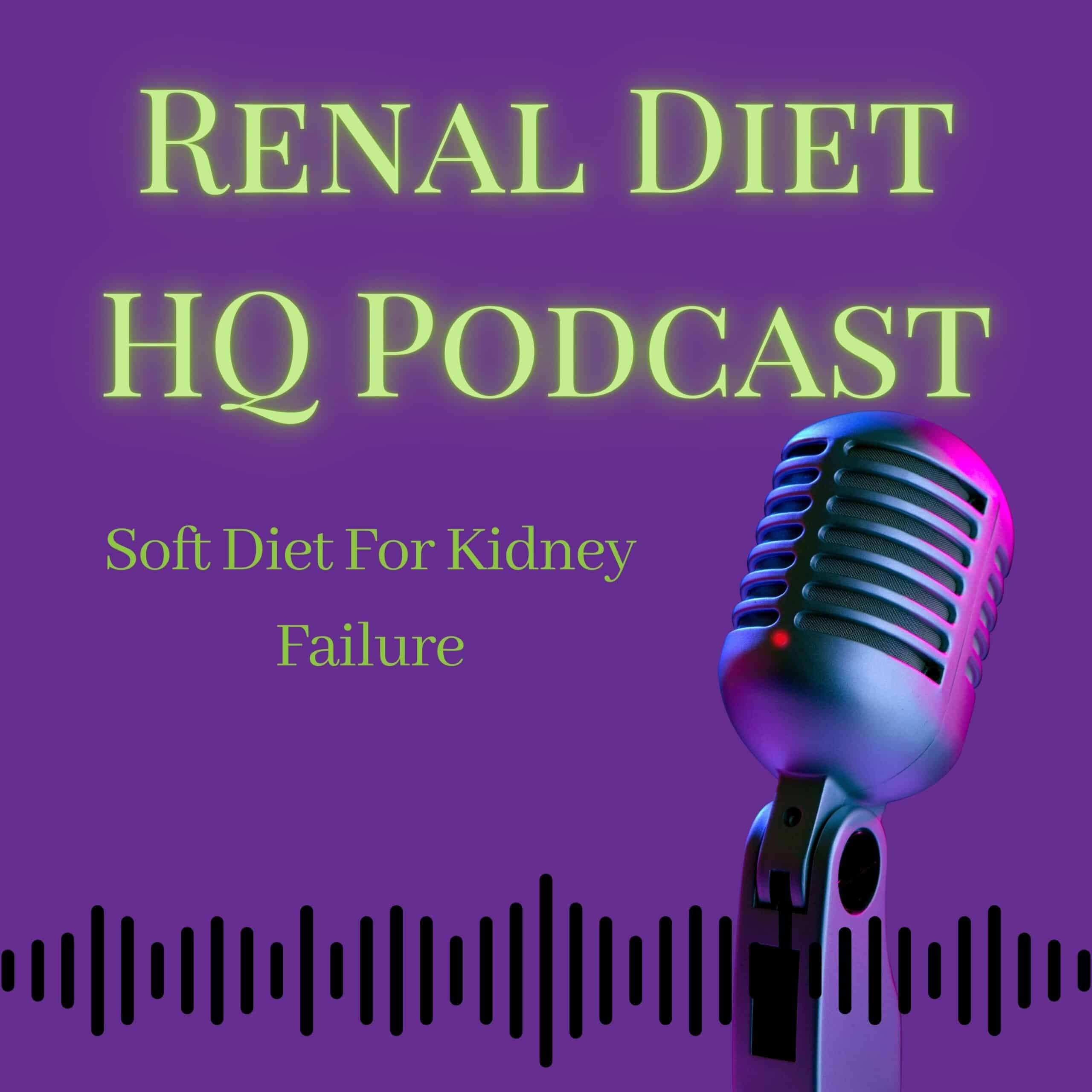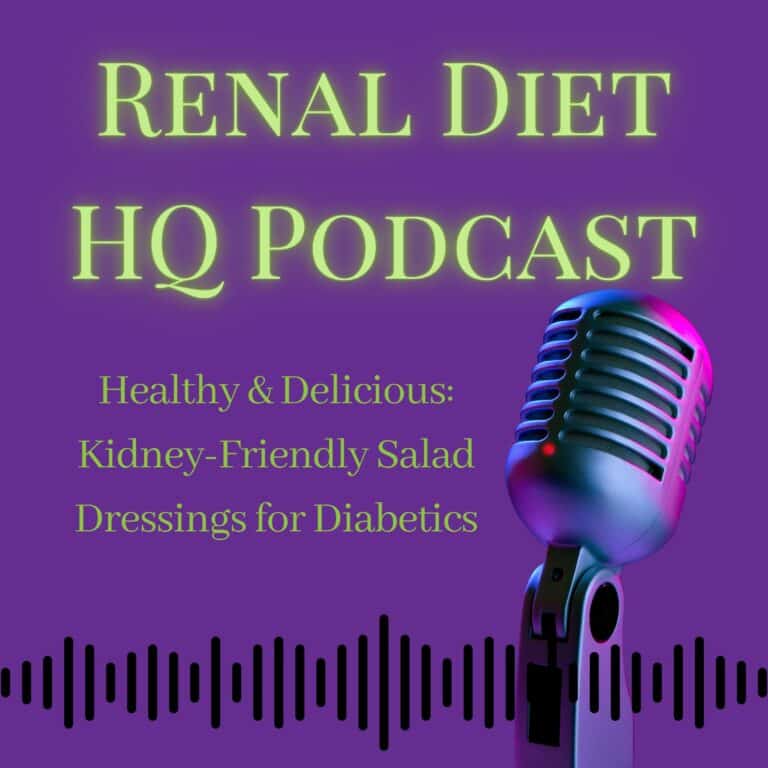Soft Diet For Kidney Failure-Podcast
Podcast: Play in new window | Download

Managing kidney health is critical for individuals living with chronic kidney disease (CKD) or kidney failure. One effective way to support overall health is through diet, particularly by following a soft diet tailored for kidney needs. A soft diet includes softer, easily digestible foods, helping manage symptoms while ensuring adequate nutrition. This post explores the benefits, considerations, and practical tips for following a soft diet for kidney failure.
For More Recipes and Ideas --->> Get Your Free Meals and Recipes That Are Perfect for Pre-Dialysis Diets, Pre-Dialysis with Diabetes, or Dialysis Diets.
Understanding the Soft Diet
A soft renal diet is specifically designed to ease the digestive process and reduce strain on the kidneys. It typically includes soft, easily digestible foods, which help manage symptoms of kidney disease while ensuring that individuals receive essential nutrients. The primary goal of a soft diet is to provide nourishment without overwhelming the digestive system, making it especially beneficial for those experiencing difficulty swallowing or chewing.
Benefits of a Soft Diet
Improved Nutritional Status
A soft diet can significantly enhance overall health. By focusing on nutrient-rich foods that are easy to digest, individuals can ensure they receive essential nutrients, including calcium and vitamins. This improvement in nutritional status positively impacts energy levels, immune function, and overall well-being.
Reduced Kidney Strain
Following a diet tailored for kidney health can help alleviate pressure on the kidneys, potentially slowing disease progression. Soft foods are generally lower in potassium and phosphorus, which are crucial for kidney health. By carefully managing nutrient intake, individuals can better support their kidney function and overall health.
Positive Effects on Blood Health
One of the critical advantages of a soft diet is its impact on blood pressure and cholesterol levels. A diet low in sodium and unhealthy fats promotes healthier blood vessels and overall cardiovascular health. This dietary approach can help manage common issues associated with kidney failure, improving long-term health outcomes.
Potential Drawbacks
Risk of Protein Deficiency
While there are many benefits to a soft diet, it’s essential to be aware of potential drawbacks. One significant risk is inadequate protein intake. Individuals with kidney failure need to adjust their protein intake based on their CKD stage; typically, 0.6-0.8g of protein per kg of body weight for pre-dialysis patients. If individuals do not receive enough protein from their food sources, it can lead to muscle loss and fatigue over time.
Nutritional Education Needs
Individuals on a soft diet may face the risk of malnutrition or weight loss if they do not consume sufficient calories. Therefore, proper nutrition education is crucial for those following special diets. It ensures that individuals are aware of their dietary needs and can manage their health effectively.
The Importance of Professional Guidance
Adhering to a kidney failure-specific soft diet should always be done under the supervision of a doctor or dietitian. Their guidance is vital for avoiding potential risks and ensuring that individuals receive all the necessary nutrients for daily functioning. Consistent monitoring by healthcare professionals helps maintain overall health and well-being, making it essential for anyone considering dietary changes.
Short-Term Benefits
In addition to long-term advantages, a soft diet offers several short-term benefits that should not be overlooked. These include improved nutrition, appropriate protein intake, and the ability to incorporate dietary supplements into daily meals. A well-planned soft diet provides essential nutrients and can enhance overall health, regardless of the stage of kidney disease.
Practical Tips for Following a Soft Diet
Meal Planning Strategies
While eating a soft diet may sound straightforward, it requires careful planning to ensure individuals get all the necessary vitamins and minerals. Thoughtful meal planning can help maximize the benefits of a soft diet while meeting dietary restrictions.
Choosing the Right Foods
Opt for soft foods that are easy to digest, such as mashed potatoes, cooked carrots, applesauce, smoothies, and steamed fish. Avoid hard, crunchy, or processed foods that may be difficult to chew or digest. Adjust consistency using liquids like milk or broth for pureed meals.
Incorporating Supplements
Incorporating nutritional supplements into a soft diet can provide additional health benefits. These supplements can help ensure individuals receive adequate nutrition, especially if they struggle to meet their dietary needs through food alone.
A soft diet for individuals with kidney failure offers numerous benefits, including improved nutrition and reduced strain on the kidneys. By focusing on nutrient-rich, easy-to-digest foods and adhering to recommended dietary guidelines, individuals can enhance their quality of life. Always consult with a healthcare professional or dietitian to personalize dietary plans effectively, ensuring that they meet individual needs while promoting overall health.
Learn more about Dietary Strategies for Chronic Kidney Disease Management CKD Diet Overview- Podcast
Learn more about Boosting Flavor Without Salt Using herbs and spices to enhance your meals-Podcast









